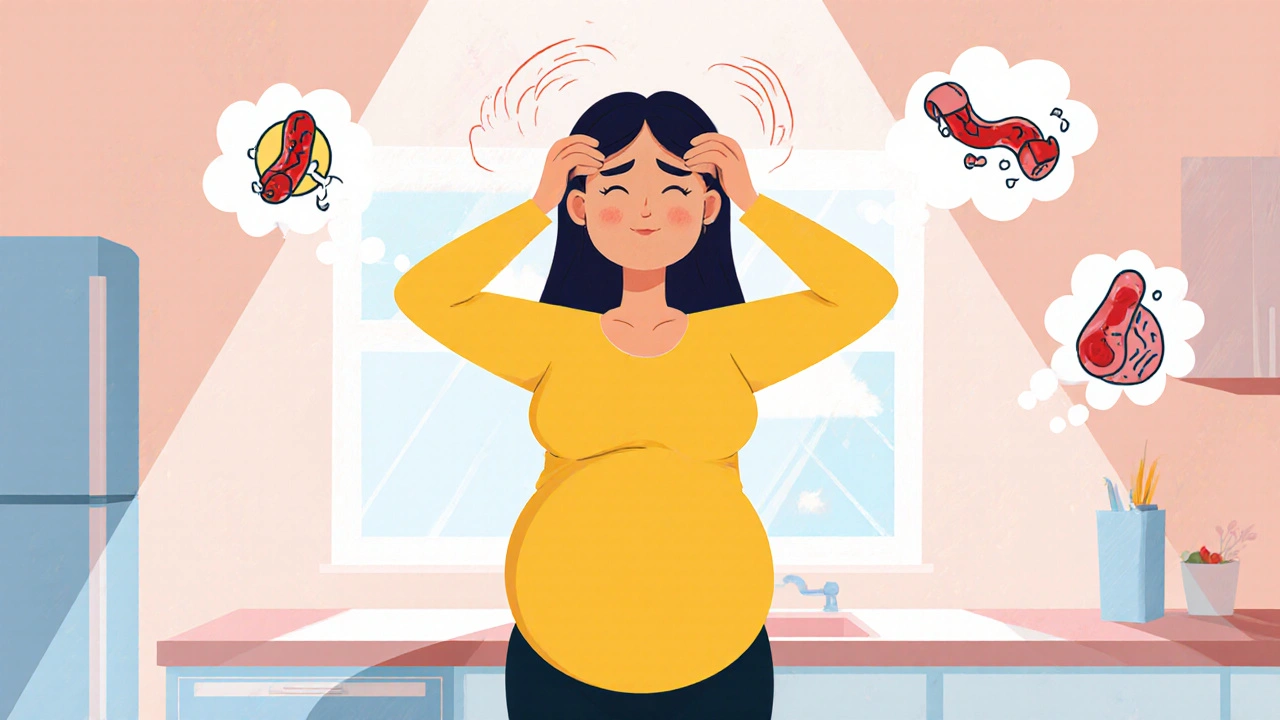Migraine Relief Guide
Migraine Symptom Assessment
Answer the questions below to get personalized migraine relief guidance during pregnancy.
Personalized Relief Guide
Migraine in pregnancy is a type of severe headache that occurs during gestation, often influenced by hormonal shifts and vascular changes. If you’re expecting a baby and a migraine hits, the pain can feel amplified and the usual meds might feel off‑limits. The good news? There are plenty of strategies that keep both you and the developing fetus safe while easing the throb.
Key Takeaways
- Most migraine triggers are still relevant during pregnancy, but hormonal swings can make attacks more frequent.
- Acetaminophen is the first‑line medication; most other drugs need careful doctor supervision.
- Hydration, regular sleep, magnesium, and gentle movement often cut the intensity of attacks.
- Seek medical care if headaches are sudden, severe, or accompanied by vision changes or swelling.
Understanding Migraine During Pregnancy
Pregnancy reshapes your body in ways that directly affect migraine patterns. Rising estrogen levels can dilate blood vessels, a classic migraine trigger. At the same time, blood volume increases by about 40%, which can shift fluid balance and spark headaches. Common triggers-caffeine, certain foods, stress, and irregular sleep-don’t disappear, they just interact with these new hormonal dynamics.
Research from 2023 involving over 2,000 pregnant women showed that 25% experienced a change in migraine frequency: half reported an increase, while the other half saw relief after the first trimester. Knowing that your experience is normal helps you stay proactive rather than frustrated.
Safe Pharmacologic Options
When home remedies aren’t enough, medication may be necessary. The safest choice is Acetaminophen. Studies confirm it crosses the placenta in low amounts and has not been linked to birth defects when used at recommended doses (up to 3,000 mg per day).
Other options require a doctor’s green light:
- Ibuprofen and other NSAIDs are generally avoided after 20 weeks because they can affect fetal kidney development.
- Triptans (e.g., sumatriptan) are listed as Category C; some specialists prescribe them when migraines are debilitating, but only after a risk‑benefit discussion.
- Anti‑nausea meds like Ondansetron may be used for severe vomiting, but again under close supervision.
Always talk to your OB‑GYN or a headache specialist before adding any new drug, even over‑the‑counter formulas.

Lifestyle & Home Remedies
Non‑drug strategies are the backbone of migraine pregnancy relief. Here are the most effective ones:
- Hydration: Aim for at least 2.5 L of water daily. Dehydration narrows blood vessels, which can trigger a migraine.
- Regular Sleep: Keep a consistent bedtime and wake‑up schedule. Even a 30‑minute shift can set off an attack.
- Cold or Warm Compress: A cold pack on the forehead can numb pain, while a warm towel on the neck eases muscle tension.
- Magnesium: Magnesium supplementation (200-400 mg per day) has been shown to reduce migraine frequency by up to 30% in pregnant women.
- Ginger or peppermint tea: Both have mild anti‑inflammatory properties and can calm nausea.
- Essential Oils (lavender or rosemary): Diffusing 3-4 drops can provide a soothing environment, but keep them diluted and avoid direct skin contact.
Stress Management & Relaxation Techniques
Stress hormones can amplify migraine pain, so learning to unwind is essential. Consider these low‑impact activities:
- Prenatal yoga: Gentle poses improve circulation and reduce muscle tension without compromising safety.
- Deep‑breathing exercises: Inhale for 4 seconds, hold for 4, exhale for 6. This simple rhythm lowers cortisol levels.
- Biofeedback: Some clinics offer sessions that teach you to control heart rate and muscle tension, cutting down on migraine severity.
- Progressive muscle relaxation: Tense each muscle group for five seconds, then release. It’s especially helpful before bedtime.
Even a 10‑minute daily routine can make a noticeable difference.

When to Seek Medical Help
Most migraines are manageable, but certain warning signs demand immediate attention:
- Sudden, "worst‑ever" headache that peaks in seconds.
- Visual disturbances such as flashing lights or loss of vision.
- Swelling of the face or hands, high blood pressure, or sudden weight gain-a possible sign of preeclampsia.
- Persistent vomiting that prevents you from staying hydrated.
If you notice any of these, call your healthcare provider or head to the ER right away.
Quick Relief Checklist
| Step | Action | Why It Helps |
|---|---|---|
| 1 | Find a dark, quiet room | Reduces sensory triggers that worsen pain |
| 2 | Apply a cold compress to the forehead | Vasoconstriction eases the throbbing sensation |
| 3 | Drink 500 ml of water | Rehydrates and helps normalize blood flow |
| 4 | Take 650 mg acetaminophen (if approved) | Blocks pain signals safely during pregnancy |
| 5 | Practice slow breathing for 5 minutes | Lowers stress hormones that can intensify pain |
Frequently Asked Questions
Can I use ibuprofen in the first trimester?
Doctors generally advise against ibuprofen during the first trimester because it may interfere with the implantation process. Acetaminophen is the preferred option.
What natural foods can help prevent migraines?
Leafy greens rich in magnesium (spinach, kale), omega‑3‑filled fish like salmon, and ginger tea are all associated with fewer migraine days.
Are triptans safe after the first trimester?
Triptans are classified as Category C. Some specialists prescribe them after the first trimester when migraine severity is high, but only after weighing potential risks with you.
How much magnesium should I take?
Most studies suggest 200-400 mg of elemental magnesium daily, split into two doses, is both safe and effective during pregnancy.
When must I call my doctor for a headache?
If the headache is sudden and severe, accompanied by vision changes, swelling, high blood pressure, or persistent vomiting, seek medical care right away.





Ankitpgujjar Poswal
October 19, 2025 AT 14:29Listen up, pregnant warriors, you can beat these migraines with determination. Hydration is non‑negotiable, so drink that 2.5 L of water like a champion. Keep a sleep schedule tighter than a drum, because erratic nights only fuel the pain. Magnesium isn’t just a supplement, it’s your secret weapon – take the recommended dose and feel the pressure drop. If you need medication, stick to acetaminophen and never exceed the safe limit, your baby’s safety comes first.
Bobby Marie
October 21, 2025 AT 08:09Just drink water and sleep, that's it.
Caroline Keller
October 23, 2025 AT 01:49I feel the agony like a storm inside my skull and it haunts every waking moment. The hormones twist my nerves and the pain becomes a cruel companion. I watch other pregnant women glide through their days while I am chained to darkness. The doctors offer pills but their warnings echo like distant thunder. I crave relief yet I fear what I might give to the tiny life within. Every migraine feels like a betrayal by my own body. The constant nausea amplifies the dread and I cannot escape the cycle. I cling to ginger tea like a lifeline but sometimes it barely touches the surface. The cold compress becomes a desperate shield against the relentless throbbing. I pray for a night of sleep that will not end in a headache. My partner watches me suffer and I silently wish he could take the pain away. The safety of the baby hovers over every decision I make. I have read about magnesium and I trust the studies, yet I still doubt if it will work for me. The fear of preeclampsia looms like a shadow over my mind. I am torn between the need for immediate relief and the responsibility of protection. I long for a moment when the migraine finally fades and I can simply breathe.
dennis turcios
October 24, 2025 AT 19:29Your dramatics are noted but the facts are clearer. Studies show magnesium can cut migraine frequency and it is safe in pregnancy when dosed properly. Relying on emotional turmoil won’t change the physiology. Stick to the evidence based recommendations and consult your physician before adding any new supplement.
Felix Chan
October 26, 2025 AT 12:09Hey, great points from Ankit – staying hydrated and getting solid sleep really are game changers. I’ve been there, and once I set a bedtime alarm, the headaches dropped dramatically. Keep the momentum going, you’ve got this!
Maridel Frey
October 28, 2025 AT 05:49Dear community members, it is essential to approach migraine management during pregnancy with both inclusivity and evidence‑based practice. Adequate hydration, consistent sleep hygiene, and magnesium supplementation have been shown to provide measurable benefit. Please ensure any medication, including acetaminophen, adheres to recommended dosing guidelines and is discussed with your obstetric provider. Should severe symptoms arise, timely medical evaluation is paramount to safeguard both maternal and fetal health.
Madhav Dasari
October 29, 2025 AT 23:29Wow, that was a powerful reminder! I love how you packed all the crucial steps into one supportive shout‑out. It really hits home for anyone feeling overwhelmed. Thanks for keeping it real and encouraging us to stay on track.
DHARMENDER BHATHAVAR
October 31, 2025 AT 17:09Maintain regular water intake and a steady sleep schedule for optimal migraine control.